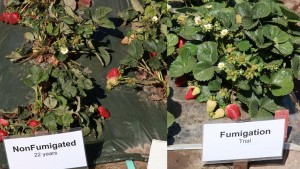But Alameda County Superior Court Judge Frank Roesch was skeptical, according to a transcript of the hearing. "My initial reaction," he said, "was that...I don't understand how any late-breaking fact of any variety would be relevant in the consideration of a case that would be determined on an administrative record."
The judge then made an announcement: “I have made a decision in the case, and I’m in the process of writing it up." To the surprise of many in the courtroom, Roesch then offered a candid explanation of his yet-to-be-released opinion: California regulators broke state law in approving methyl iodide by failing to take a close enough look at alternatives to the chemical or at the ramifications of not approving methyl iodide for use in California at all.
Furthermore, Roesch said, the approval by the Department of Pesticide Regulation was not based on sound science, and state regulators “cobbled together” different methodologies in order to reach a decision. There was “no evidence” to justify that process, the judge said.
Roesch also appeared to agree with plaintiffs that the state hadn’t adequately studied whether methyl iodide could harm developing fetuses in pregnant farm workers or in women who live near strawberry fields.
“I think the (California) Birth Defect Prevention Act was also violated,” said the judge, who added that his decision probably wouldn’t address that particular issue because the other grounds were sufficient.
Then, Roesch turned to Arysta’s attorneys. “Now that you are aware of what the court is going to decide when I get around to finishing writing it up, tell me what you think I should consider?”
Stanley Landfair, an attorney for Arysta LifeScience, explained to the judge that the company had recently removed methyl iodide from the market nationally and revoked its request for registration in California. “Arysta, even if it wanted to, could not sell this product in the state of California any longer,” Landfair said. “We believe that renders the case moot."
Roesch said he will issue his opinion on whether or he will dismiss the case May 1.
Pesticide activists say the timing of Arysta’s announcement is no coincidence.
“If the judge dismisses the case,” said Paul Towers of Pesticide Action Network North America, one of 17 plaintiffs in the case, “California will have let a pesticide corporation off the hook and failed to fix our broken regulatory system.”
In a statement [PDF], Arysta reiterated that the decision to withdraw methyl iodide was a financial one and declined to comment on the court case.
Despite methyl iodide’s approval in California, only a handful of farmers actually have used the fumigant. Some local agricultural authorities have declined to issue permits for the chemical, and farmers have complained it’s too costly to comply with safety precautions required by the state.
In its statement, Arysta said pulling methyl iodide off U.S. shelves will allow the company to focus on other markets, including Mexico, which is second after California in supplying strawberries to the U.S. Methyl iodide is legal in seven other countries, but used in just one of them, Japan.
Meanwhile, while methyl iodide is off the table in California, Arysta has not ruled out bringing it back elsewhere in the country. While it is “suspending its support” of methyl iodide nationwide, Arysta will continue to maintain its 2007 U.S. Environmental Protection Agency registration, which keeps the door open for future sales.
